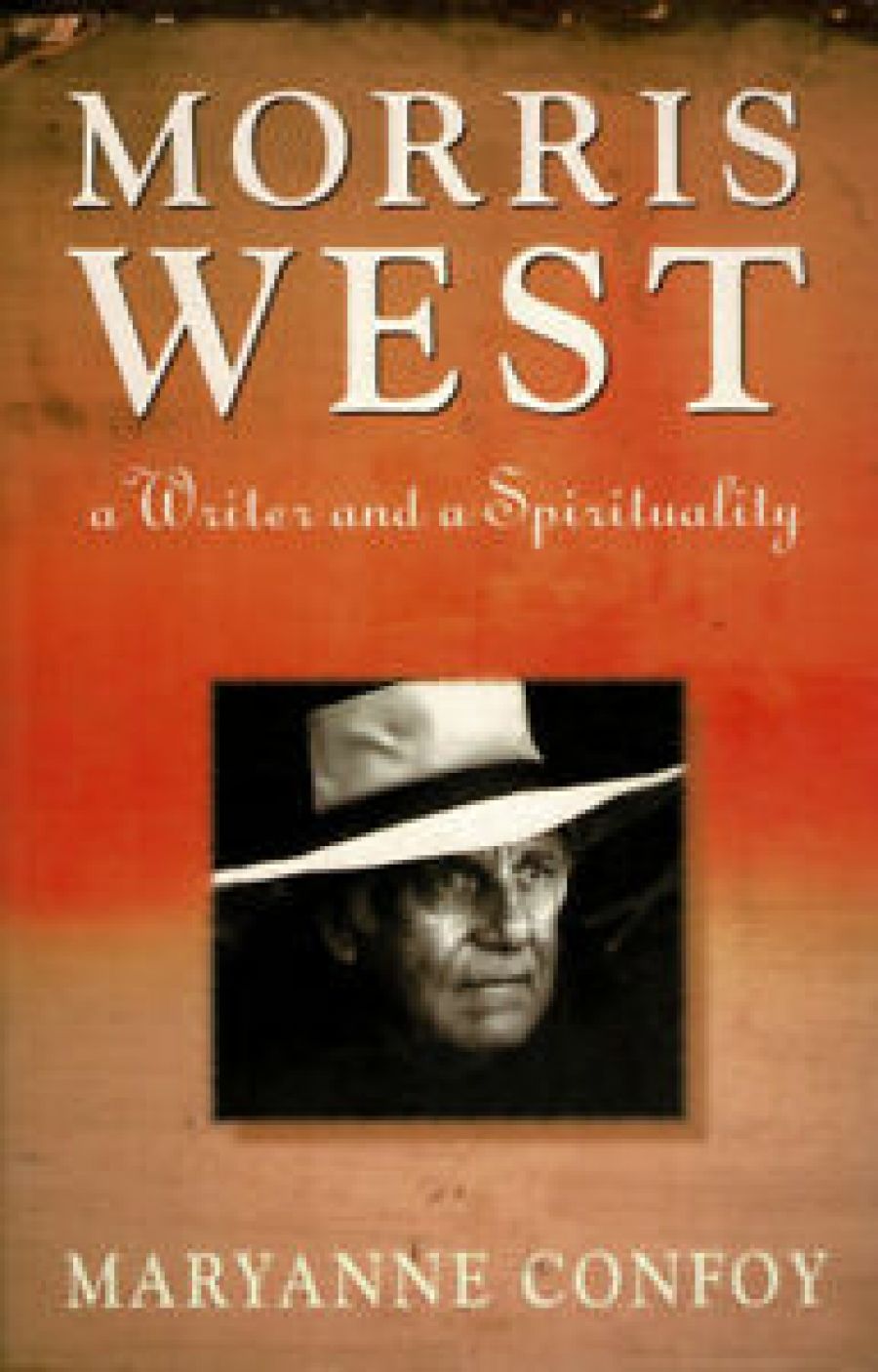
- Free Article: No
- Contents Category: Religion
- Review Article: Yes
- Article Title: Spiritual Quest
- Online Only: No
- Custom Highlight Text:
‘Until the last decade or so,’ writes Maryanne Confoy, ‘most people thought of spirituality, if they thought of it at all, as something for other people.’ It is certainly true that there is a new and quite sudden interest in spirituality in this country, and this book on the spirituality of Morris West is a timely addition to the growing tradition of – what can we call it? – ‘wisdom writing’ in contemporary Australia. It might be a symptom of the turn of the millennium, it might be a reaction to the craziness and fragmentation of the modern world, it might be a sign of cultural disorientation and the search for roots – however we attempt to account for it, spirituality and the quest for meaning is back on the public agenda and is in great demand. Just ask your local bookseller.
- Book 1 Title: Morris West
- Book 1 Subtitle: A writer and a spirituality
- Book 1 Biblio: HarperCollins Religious, $22.95 pb, 173 pp
We might have guessed that a change in cultural direction was on its way. It has always fascinated me that a country which officially pretends to be secular and materialistic has produced a veritable flock of visionaries and spiritual artists, from Arthur Boyd through to Michael Leunig, from Patrick White to Tim Winton, from Judith Wright to Les Murray.
Since the 1950s at least, Australian art has been intensely spiritual, and because the arts are always prophetic, and always point to future directions in society, it is about right that the big public impact of these shock-waves are due to hit the lucky country about now. People are clamouring for this and that philosophy, for this or that guru, and the books that teach us how to live are hugely popular.
This change has surprised and amazed the churches, which are not quite sure how to respond. Is this the stirrings of the Holy Spirit? Or is it the restless activity of the lost and confused masses, who need to be shown the way back to the tried and true faith? Whatever we imagine it to be, it seems beyond doubt now that the thing we call ‘spirit’ has actually escaped from the old bottle marked ‘religion’, and the churches no longer hold a monopoly on spirituality. Out of fear and resentment, some within the churches are joining the high-cultural condemnation of the so-called ‘New Age’ – and for precisely the same reasons: the new searchings are wild and passionate, represent a threat to existing structures, and produce anxiety in those who want the spirit back in the old bottle again.
Morris West is an important cultural figure at precisely this moment in our history. He is both a committed Christian, a Catholic, and an existentialist who questions all authorities and who insists on the right of the individual to explore his or her own spiritual life. Maryanne Confoy manages a difficult balancing act in this book, representing West as a living paradox, a man who respects the old bottle called religion, yet whose spirit frequently escapes all known categories and religious conventions. Precisely because our Australian Catholic tradition has been, at certain institutional levels, so oppressively limited and overbearing, so disconnected from ordinary human experience, it has given rise to a significant number of creative writers and progressive thinkers who attempt balancing acts between authority and originality, conformity and exploration, religion and spirituality. West’s life has from the beginning been poised across these contradictions, and yet in maintaining a vigorous dialectic across these polarities he has managed, I think, to successfully convert contradiction into paradox.
It saddens me, however, to think that most of this negotiation and spiritual struggle occurs in isolation and outside the institutions. The institution of the church grinds on, and in many cases it just grinds over those who question or explore new pathways. Those who lack West’s skills at negotiation and compromise, yet who share his longing for spiritual challenge and adventure, most often find themselves outcast and marginalised, no longer included within the sacred circle. Only those who are prepared to do a lot of fast foot-work are able to maintain the contradictions and remain within the church structures.
Maryanne Confoy has pitched this book at the right level. She does not assume that her readers are uncritical followers of church dogma. She assumes that spirituality and religion are different things, that they often collide and sometimes even work against each other. Yet she also holds out the hope that both can be reconciled: that religion will learn from the brave and courageous challenges of its most creative adventurers, and that the individual spiritual journey will transcend its own obsessive ‘personalism’ and finds its way back to a (transformed) tradition of the sacred. I share her idealism, but it will be a long road, not to be experienced in our lifetime.
This book is a series of selected quotations from West’s voluminous writings, linked together by a sensitive and enquiring commentary. Inevitably perhaps for a book like this, the ‘prophetic’ nature of West’s utterings sometimes becomes wearisome, and we feel there is not enough humour, irony, or self-criticism. But this is partly because Confoy has deliberately singled out all the ‘profound’ paragraphs and sentences, thus losing, quite intentionally, the fictional context that so often gives levity or structural irony to the spiritual pronouncements. The book is about Morris West as prophet, and as prophet he does in fact come across as a substantial figure, often more significant than his status in Australian literary circles would allow.


Comments powered by CComment